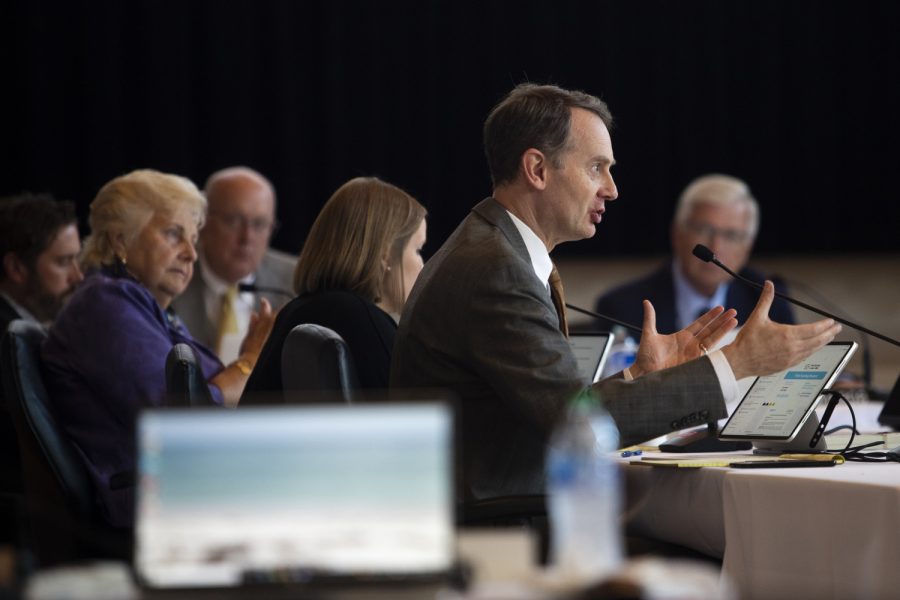Regents to consider tuition increases at Iowa’s three public universities
The increase would include a baseline increase to tuition for UI students and an increase in the student activity fee.
David Barker, a regent, speaks at the Iowa Board of Regents meeting hosted at the University of Northern Iowa on Sept. 15, 2022.
May 9, 2023
Students at Iowa’s three regent universities could be subject to a 3.5 percent tuition and fee increase for the 2023-24 academic year.
The state Board of Regents received a proposal that outlines a tuition increase for in-state undergraduates at the regent’s three universities. At the University of Iowa, that would mean an increase of $305 for undergraduate students who are in-state residents.
For non-resident undergraduates, Iowa’s public universities are proposing different tuition increases:
- University of Northern Iowa wants to increase non resident undergraduate tuition by 3.5 percent.
- Iowa State University wants to increase non resident undergraduate tuition by 4 percent.
- The UI wants to increase non-resident undergraduate tuition by 1 percent.
The proposal included varying tuition rates for graduate and professional programs and different rates for higher-cost programs.
The increase in tuition is to support financial challenges, including inflation, recruitment, and retention of faculty and staff, the ability to meet collective bargaining terms, academic facilities’ deferred maintenance needs, and student financial aid.
Differential rates for higher-cost programs are meant to direct the cost to those who participate in the programs rather than charging the entire student body.
The Radiation Sciences Program of the Carver College of Medicine at UI requested a $1,394 increase in tuition for undergraduate students.
If approved, the fee increase is expected to be the first in a three-year rate increase meant to fund the program, which is currently in deficit. The rate hike would balance the budget.
Other varying tuition rate areas include:
- The UI College of Law is proposing a 3.5 percent increase in the non-resident tuition rate.
- The Master of Science in Athletic Training is proposing a 2.5 percent increase for resident and non-resident students.
- The Master of Science in Clinical Nutrition is proposing a 2 percent increase in tuition for resident students.
- The UI College of Pharmacy is proposing an increase of $138 in tuition for resident and non-resident students in the PharmD program
The proposal also included a $306 increase in student fees at the UI.
The cost increase is meant to support the UI’s plan to renovate the Iowa Memorial Union and includes a new Iowa Memorial Union Facilities fee, a line item costing $240 per undergraduate and $200 per graduate or professional student. If approved, the fee is expected to become annual.
In addition to the Iowa Memorial Union Facilities fee, there are a variety of smaller cost increases proposed by the UI ranging from technology to health to recreation.
- The UI recommended a 5.3 percent increase to technology fees meant to fund the increases in IT expenditures caused by inflation.
- The student services fee was increased $5 to address student staffing and fuel costs.
- The student activities fee increased $2 to support basic needs—food, clothing—services.
- The health fee increased $17 to support increased demand and higher costs.
- The mental health fee increased by $3 to fund the remaining 50 percent of the Behavioral Health Clinical Manager’s pay. The other 50 percent will be provided by University Counseling Services.
- The recreation fee increased $10 to account for increased operational and programming costs and a decrease in non-student memberships.
The regents are expected to hear from the universities and vote on the proposal in their meeting on Thursday.



